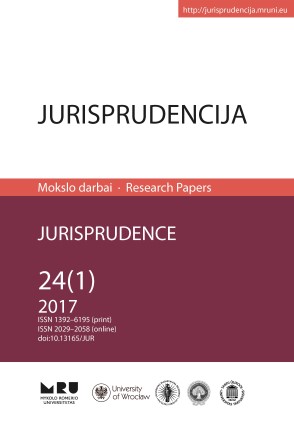LIETUVOS KONSTITUCINĖS TAPATYBĖS IR ŽMOGAUS TEISIŲ APSAUGOS SĄVEIKA
THE INTERACTION BETWEEN THE CONSTITUTIONAL IDENTITY OF LITHUANIA AND THE PROTECTION OF HUMAN RIGHTS
Author(s): Dainius ŽalimasSubject(s): Law, Constitution, Jurisprudence, Constitutional Law, International Law, Human Rights and Humanitarian Law
Published by: Mykolas Romeris University
Keywords: constitutional identity; human rights; respect for international law; principle of the geopolitical orientation of the state;
Summary/Abstract: The article examines the interrelationship between the constitutional identity of Lithuania and human rights protection. It is maintained that this interrelationship is apparent through two key aspects.First and foremost, respect for innate human rights in itself constitutes an inseparable part of the Lithuanian constitutional identity. Although the Constitutional Court has not so far directly expressed its position concerning the Lithuanian constitutional identity, the category of fundamental constitutional values, single dout by the Constitutional Court in its decision of 19 December 2012 and ruling of24 January 2014, is very important in this respect. This category comprises values consolidated in Articles 1 and 18 of the Constitution, such as the independence of the state, democracy, the republican form of government, and the innate nature of human rights and freedoms. These values are indivisible from the Lithuanian constitutional identity, since creating and fostering an independent and democratic state that respects innate human rights is a Lithuanian historical and constitutional tradition. This tradition derives from the fundamental acts of the independence of the state, i.e. the Act of Independence of 16 February of 1918, the Declaration of the Council of the Movement of the Struggle for Freedom of Lithuania, which was adopted in 1949 at the time of the occupation, and the Act of 11 March 1990. This is reflected in the first democratic Constitution of the State of 1922 and is consolidated in the current Constitution. In view of the historically consistent obligation to respect innate human rights, it can be stated that the protection of these rights has become a particular metanorm, expressing the essence of the Constitution as a social contract and supreme law. This is especially evident from the doctrine formulated by the Constitution Court regarding the constitutionality of constitutional amendments in the rulings of 24 January 2014 and 11 July. In its ruling of 11 July2014, the Constitutional Court held that it is not permitted to adopt any such constitutional amendments that would destroy the innate nature of human rights and freedoms, democracy, or the independence of the state. Consolidating the recognition of the innate nature of human rights, Article 18 of the Constitution formally belongs to those provisions of the Constitution that are subject to the general constitutional amendment procedure. However, taking into account an intrinsic relationship between democracy and respect for innate human rights, the Constitutional Court ranked the innate nature of human rights and freedoms, along with the independence of the state and democracy, as unamendable or “eternal”constitutional provisions. Thus, the innate nature of human rights, as a universal value constituting one of the fundamental elements of the Lithuanian constitutional identity, is under the highest-level constitutional protection.The second aspect revealing the interrelationship between the constitutional identity and human rights protection is the influence of other elements of the constitutional identity on the constitutional standards of human rights protection.In the formation of the official doctrine on human rights protection, the Constitutional Court places considerable importance on the idea of a democratic state under the rule of law. Other elements of the Lithuanian constitutional identity,in particular the principle of respect for international law and the principle of the geopolitical orientation of the state, are also particularly significant for the constitutional protection of human rights. The principle of respect for international law(pacta sunt servanda), as entrenched in Article 135(1) of the Constitution, implies the obligation of the State of Lithuania to comply with the norms of international treaties and customary international law, including the area of human rights. The principle of the geopolitical orientation of the state likewise guides towards openness to international human rights obligations. This principle implies Lithuania’s membership in the European Union and NATO, as well as the necessity to fulfil the related international obligations. The principle of geopolitical orientation, which is underpinned by common values shared by Lithuania with democratic Western states, similarly provides a value-based guidance in assuming international obligations and presumes the necessity to pay regard to the European standards of human rights protection and tendencies in their development. In this context, special importance also falls on the principle of an open civil society, which means that Lithuanian society is open to the international community and tendencies in the development of international law. The self-isolation of the state or disregard for international standards of human rights protection would be incompatible with the principle of an open civil society.
Journal: Jurisprudencija
- Issue Year: 24/2017
- Issue No: 1
- Page Range: 35-49
- Page Count: 15
- Language: Lithuanian

